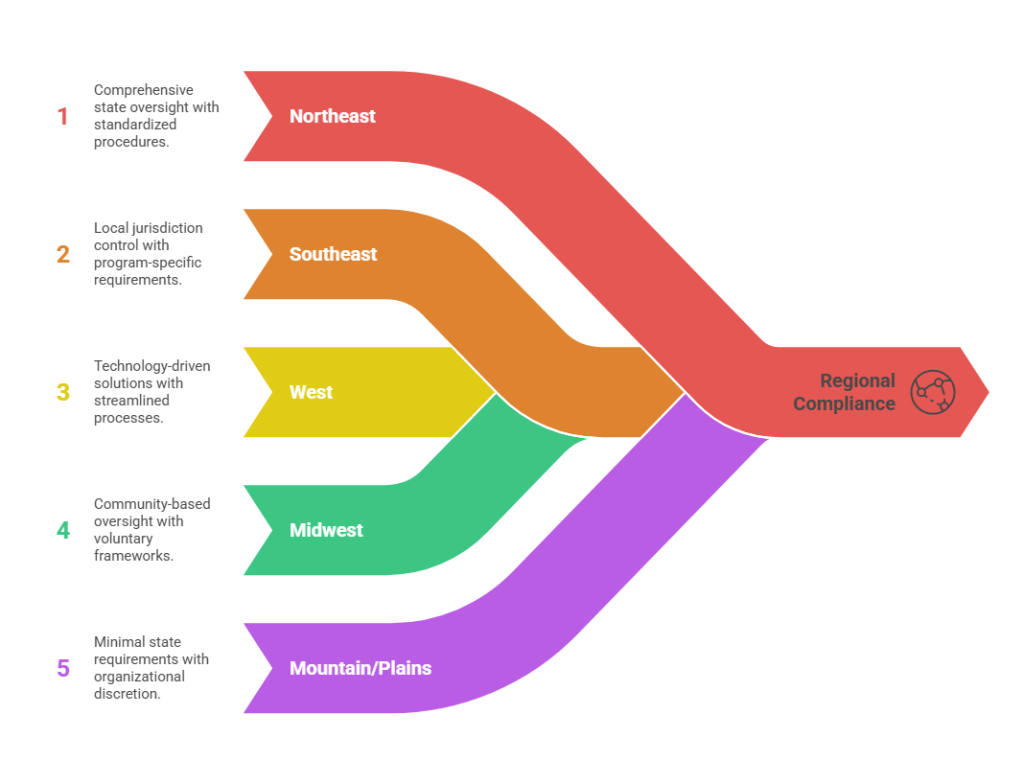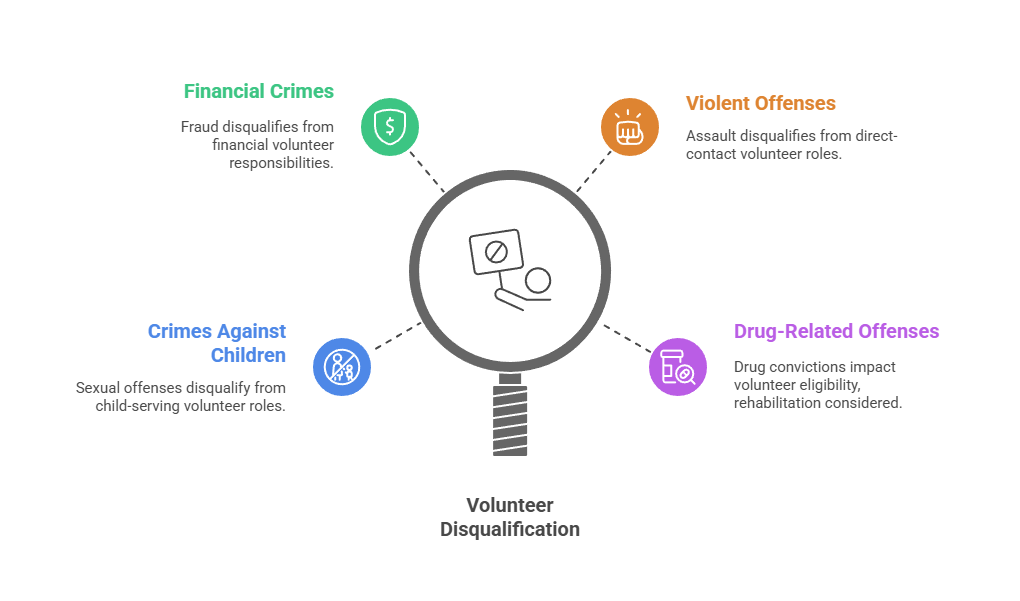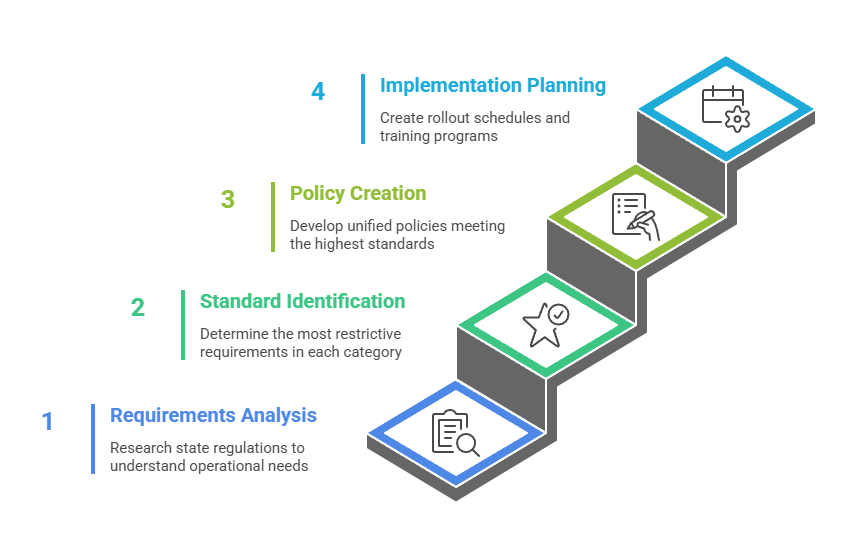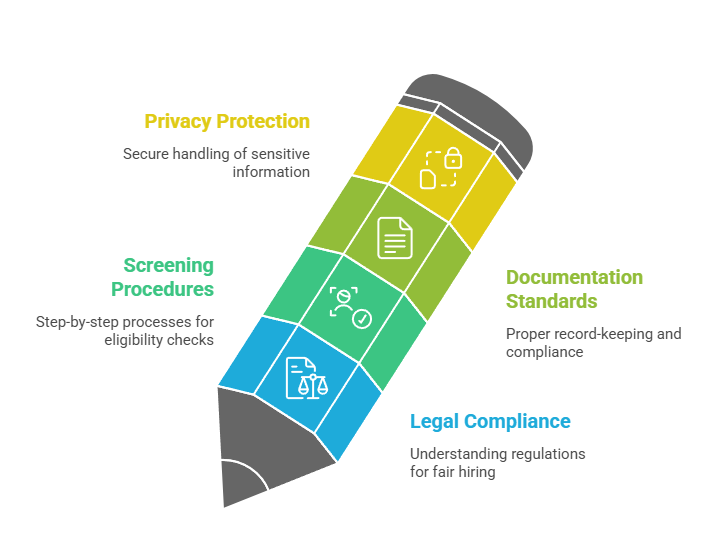Volunteer screening requirements vary significantly across the United States, creating compliance challenges for nonprofit organizations that operate in multiple jurisdictions. Understanding these state-specific legal requirements is essential for nonprofits to protect vulnerable populations while avoiding legal liability and maintaining operational efficiency.
Key Takeaways
- State laws differ drastically: Some states mandate comprehensive background checks for all volunteers working with vulnerable populations, while others have minimal or no statutory requirements.
- Vulnerable population focus: Most screening regulations specifically target volunteers working with children, elderly individuals, or disabled persons, with enhanced requirements for these roles.
- Compliance complexity increases: Nonprofits operating across multiple states must navigate varying documentation requirements and renewal timeframes to maintain legal compliance.
- Criminal history limitations: Many states restrict which types of convictions can disqualify volunteers, with some prohibiting discrimination based on certain offense categories or timeframes.
- Documentation standards vary: States differ in their requirements for screening documentation, retention periods, and acceptable provider qualifications.
- Regular updates needed: State regulations change frequently, requiring nonprofits to maintain current knowledge of applicable laws and adjust policies accordingly.
Understanding Federal vs. State Screening Requirements
Federal laws provide the foundation for volunteer screening regulations. However, state-level requirements create the specific compliance framework that nonprofits must follow. The Fair Credit Reporting Act (FCRA) governs how background checks are conducted and reported. Additionally, individual states determine which volunteers must be screened and what disqualifying factors apply through their specific regulations.
Most screening requirements focus their regulations on protecting vulnerable populations. Children, elderly individuals, and disabled persons receive enhanced protection through mandatory screening requirements. Furthermore, volunteers who work directly with these groups face more stringent processes than those in general nonprofit roles.
Comprehensive State-by-State Legal Requirements
Understanding screening requirements necessitates examining each jurisdiction's specific mandates, exemptions, and compliance procedures. State requirements vary dramatically in scope, frequency, and enforcement mechanisms. The following breakdown covers key requirements for major states where nonprofits commonly operate.
| State | Child-Serving Volunteers | Elder Care Volunteers | Background Check Frequency |
| California | Comprehensive criminal + registry checks | Mandatory for direct contact | Every 3 years |
| Texas | Program-specific requirements | Local jurisdiction varies | Every 2 years |
| New York | Criminal + child abuse registry | Criminal background only | Every 4 years |
| Florida | Comprehensive screening required | Facility-specific policies | Every 2 years |
| Illinois | Criminal + registry checks | Optional but recommended | Every 3 years |
| Pennsylvania | Criminal + child abuse clearances | Facility-based requirements | Every 3 years |
| Ohio | Comprehensive for child contact | Local agency policies | Every 2 years |
| Michigan | Criminal history mandatory | Facility-specific standards | Every 3 years |
These requirements represent baseline standards that change frequently. Nonprofits must stay current with evolving regulations to maintain compliance.
California Screening Legal Framework
California maintains some of the nation's strictest volunteer screening requirements, particularly for organizations serving vulnerable populations. The state requires criminal background checks for volunteers working with children, elderly individuals, or disabled persons in most nonprofit settings. Additionally, California's comprehensive regulations include multiple database searches and regular renewal requirements.
California's "Ban the Box" legislation also restricts how nonprofits can use certain criminal history information in volunteer screening decisions. Organizations must conduct individualized assessments rather than automatic disqualifications. This approach ensures fair treatment while maintaining safety standards.
Texas Volunteer Screening Regulations
Texas takes a targeted approach to screening requirements, focusing primarily on youth-serving organizations and specific program types. The state's laws emphasize local control while establishing minimum standards for vulnerable population protection. However, many Texas municipalities have adopted enhanced requirements that exceed state minimums.
Nonprofit legal compliance in Texas requires understanding both state and local ordinances. Urban areas typically impose stricter requirements than rural jurisdictions. Additionally, organizations receiving state funding often face additional screening mandates beyond basic legal requirements.
New York State Screening Legal Structure
New York implements a tiered system based on the level of access volunteers have to vulnerable populations. Direct-contact volunteers face comprehensive screening requirements including criminal history and registry checks. Meanwhile, supervised volunteers or those with limited access may qualify for reduced screening procedures.
Screening Levels:
- Level 1 volunteers with supervised access require basic criminal history checks
- Level 2 volunteers with direct contact need comprehensive screening plus registry searches
The state recently updated its requirements to include enhanced protections for elderly populations. These changes require nonprofits to conduct additional training and documentation for volunteers working in elder care settings.
Regional Variations in Screening Requirements
Volunteer screening requirements cluster into distinct regional patterns across the United States. Northeastern states typically maintain comprehensive screening requirements with standardized procedures and centralized oversight. Meanwhile, southeastern states often delegate authority to local jurisdictions or specific program types.
Western states generally emphasize technology-based screening solutions and streamlined compliance processes. These states often provide online portals for background check submissions and automated compliance tracking. Conversely, midwestern requirements tend to focus on community-based oversight and voluntary compliance frameworks that rely on organizational self-reporting.
Regional Compliance Characteristics:

- Northeast: Comprehensive state oversight with standardized procedures
- Southeast: Local jurisdiction control with program-specific requirements
- West: Technology-driven solutions with streamlined processes
- Midwest: Community-based oversight with voluntary frameworks
- Mountain/Plains: Minimal state requirements with organizational discretion
These regional differences create unique challenges for nonprofits operating across multiple areas. Organizations must understand local variations while maintaining consistent safety standards.
Vulnerable Population Protection
Screening requirements consistently emphasize enhanced protection for vulnerable populations. However, definitions and screening requirements vary significantly between states. Children under 18, adults over 65, and individuals with disabilities receive special consideration in most state regulations. Additionally, some jurisdictions include homeless individuals, domestic violence survivors, and individuals with mental health conditions in their vulnerable population definitions.
The scope of required screening often depends on the level of access volunteers have to vulnerable populations. Supervised volunteers may face fewer requirements than those with unsupervised access or overnight responsibilities. Furthermore, volunteers who handle financial transactions or personal information typically face enhanced screening requirements regardless of population served.
Enhanced screening categories help organizations match screening intensity to volunteer roles and responsibilities. This approach ensures appropriate protection while avoiding unnecessary barriers to volunteer participation. Consequently, many nonprofits develop tiered screening systems that align with state requirements.
Criminal History Evaluation
States vary significantly in how screening regulations address criminal history information for eligibility decisions. Some states maintain automatic disqualification lists for specific offense types. Meanwhile, others require individualized assessments of all criminal history. Additionally, many jurisdictions have implemented "look-back" periods that limit how far into an individual's criminal history organizations can consider.
Common Disqualification Categories:

- Crimes against children: Sexual offenses, physical abuse, neglect charges typically result in automatic disqualification from child-serving roles
- Financial crimes: Fraud, embezzlement, identity theft convictions often disqualify volunteers from financial responsibilities
- Violent offenses: Assault, domestic violence, other violent crimes may disqualify volunteers from direct-contact roles
- Drug-related offenses: Recent drug convictions may impact eligibility though many states allow consideration of rehabilitation
The trend toward individualized assessment reflects growing recognition that blanket policies may unfairly exclude qualified volunteers. States increasingly require organizations to consider factors like offense severity, time elapsed, and evidence of rehabilitation.
Documentation and Record-Keeping Requirements
Nonprofit organizations must maintain detailed documentation to demonstrate compliance with screening requirements. Record-keeping standards vary significantly between states. This creates administrative challenges for multi-jurisdictional operations. However, most regulations require similar core documentation elements including background check reports, volunteer applications, and training records.
Documentation retention periods typically range from three to seven years depending on state requirements and organizational policies. Some jurisdictions mandate longer retention for certain types of incidents or disqualifications. Additionally, organizations must often provide documentation during state audits or investigations. Therefore, organized record-keeping remains essential for compliance.
| Documentation Type | Retention Period | Required Elements | Storage Requirements |
| Volunteer Applications | 3-7 years | Criminal history disclosure, authorization | Secure, limited access |
| Background Check Reports | 5-10 years | Criminal history, registry searches | Encrypted storage preferred |
Digital record-keeping systems have become increasingly popular for managing documentation required by screening regulations. These systems provide better organization and automated renewal reminders. Furthermore, digital systems often include enhanced security features to protect sensitive information as required by state law.
Essential Documentation Under State Laws
Every state with screening requirements mandates nonprofits maintain specific documentation types to demonstrate compliance. Basic documentation includes completed volunteer applications with proper authorization signatures and disclosure statements. Additionally, organizations must retain copies of actual background check reports and any supplemental screening materials like registry searches.
Proper documentation organization helps ensure compliance during audits and provides legal protection if incidents occur. Many states provide sample forms and documentation templates to help nonprofits maintain consistent record-keeping practices.
Digital vs. Physical Record Management Compliance
Modern nonprofits increasingly choose digital record-keeping systems over traditional paper filing for volunteer screening documentation. Digital systems offer enhanced security, better organization, and easier access during compliance audits. Additionally, these systems often include automated features like renewal reminders and compliance tracking.
However, some states maintain specific requirements for physical signatures or notarization that may limit full digital adoption. Organizations must balance the efficiency of digital systems with state-specific requirements for original documents.
Best Practices for Multi-State Compliance
Nonprofits operating across multiple states face complex compliance challenges that require strategic planning and systematic implementation. The most effective approach often involves developing standardized procedures that meet the highest applicable requirements across all operational territories. This strategy ensures consistent protection standards while simplifying administrative processes.
Creating comprehensive volunteer screening policies requires understanding the intersection of various state requirements and identifying the most restrictive mandates in each category. For example, if one state requires renewals every two years while another requires three-year renewals, adopting the two-year standard across all locations ensures compliance everywhere. Additionally, this approach reduces confusion among staff and volunteers about different requirements.
Regular policy reviews and legal updates help organizations stay current with changing regulations and emerging best practices. Many nonprofits establish quarterly review schedules to assess new legislation and update their policies accordingly. Furthermore, maintaining relationships with legal counsel experienced in screening requirements provides valuable guidance for complex compliance situations.
Unified Policy Development Strategies
Successful multi-state compliance begins with developing unified policies that address the most stringent requirements across all operational jurisdictions. This approach eliminates the need to maintain separate policies for each state. Instead, organizations create single comprehensive policies that ensure compliance everywhere they operate.
Policy Development Steps:

- Requirements Analysis: Research all applicable state regulations in operational areas
- Highest Standard Identification: Determine most restrictive requirements in each screening category
- Single Policy Creation: Develop unified policies meeting highest standards across all jurisdictions
- Implementation Planning: Create rollout schedules and training programs for consistent policy application
Unified policies simplify training, reduce compliance errors, and ensure consistent volunteer protection standards. Organizations save administrative time while maintaining legal compliance across all locations.
Centralized Screening Management Systems
Centralized screening management provides another effective strategy for multi-state compliance. Organizations can work with screening providers that handle requirements across multiple jurisdictions. These providers understand various state regulations and automatically apply appropriate screening criteria based on volunteer location and role.
Centralized systems also provide consolidated reporting that helps organizations track compliance across all locations. Administrative staff can monitor renewal dates, identify compliance gaps, and generate audit reports from single platforms. This approach reduces complexity while ensuring consistent compliance.
Cost Management and Budgeting for Legal Compliance
Volunteer background check costs can represent a significant expense for nonprofit organizations, particularly those with large volunteer programs or high turnover rates. Individual background checks typically cost between $10-50 depending on the scope of screening required and the provider used. However, many screening companies offer volume discounts that can significantly reduce per-check costs for organizations with regular screening needs.
Budget planning for volunteer screening should account for initial screening costs, renewal expenses, and potential emergency screening needs. Organizations should also consider the hidden costs of screening including staff time for processing, documentation management, and compliance tracking. Additionally, some states offer reduced-cost or free background checks for qualifying nonprofit organizations. This helps reduce overall screening expenses while maintaining compliance.
Cost Reduction Strategies:
- Volume Agreements: Negotiate annual contracts for predictable pricing and discounts
- Risk-Based Screening: Apply comprehensive screening only to high-risk positions
- State Programs: Research available reduced-cost programs for nonprofits
- Technology Integration: Use automated systems to reduce administrative time
Effective cost management ensures that budget constraints don't compromise volunteer screening quality or compliance. Many organizations find that investing in comprehensive screening actually reduces long-term costs by preventing incidents and liability issues.
Training and Policy Development for Legal Compliance

Effective volunteer screening programs require comprehensive staff training and clear policy documentation to ensure consistent implementation and compliance. Staff members responsible for volunteer screening must understand applicable regulations, proper procedures, and documentation requirements. Additionally, they need training on how to evaluate background check results and make appropriate decisions about volunteer eligibility.
Policy development should address all aspects of the volunteer screening process from initial application through ongoing monitoring and renewal. Policies must clearly define roles and responsibilities, screening requirements for different volunteer positions, and procedures for handling concerning background check results. Furthermore, policies should include appeal processes for volunteers who wish to contest screening decisions or provide additional context for their background check results.
Regular policy updates ensure that procedures remain current with changing regulations and best practices. Many organizations schedule annual policy reviews to assess effectiveness and identify improvement opportunities. Additionally, staff training should be updated regularly to reflect changes in state law and address any compliance issues that have emerged during implementation.
Staff Training Components
Comprehensive staff training ensures consistent and compliant volunteer screening practices across the organization. Training should cover legal requirements, organizational policies, and best practices for managing sensitive background check information. Additionally, staff need training on how to conduct individualized assessments when required and how to document screening decisions properly.
Training Components:

- Legal Compliance: Understanding federal and state regulations governing screening and fair hiring
- Screening Procedures: Step-by-step processes for conducting checks and making eligibility determinations
- Documentation Standards: Proper record-keeping practices and compliance verification requirements
- Privacy Protection: Secure handling of sensitive information with limited access protocols
Regular training updates help staff stay current with evolving regulations. Many organizations provide quarterly sessions and annual comprehensive reviews. This ongoing education improves compliance and reduces screening errors.
Appeal Process Development
Organizations should establish clear appeal processes for volunteers who wish to contest screening decisions. These processes provide volunteers with opportunities to explain circumstances, provide additional context, or correct inaccurate information in their background reports. Additionally, appeal procedures demonstrate organizational commitment to fairness while maintaining safety standards.
Appeal processes should include specific timelines, required documentation, and decision-making authority. Organizations must balance volunteer rights with safety requirements. Clear procedures help ensure consistent handling of appeals while protecting both volunteers and the populations they serve.
Interstate Compact and Reciprocity Issues
Many nonprofit organizations face challenges when volunteers move between states or when organizations operate across state boundaries under different requirements. Some states have developed interstate compacts or reciprocity agreements that recognize background checks conducted in other jurisdictions. However, these agreements remain limited and often apply only to specific types of screening or volunteer roles.
Organizations operating in multiple states typically cannot rely on single background checks to meet all jurisdictional requirements under various state regulations. Instead, they must often conduct separate screening processes for each state or adopt the most comprehensive requirements across all locations. This complexity has led many nonprofits to advocate for standardized national volunteer screening standards.
Federal legislation has been proposed to create uniform volunteer background check standards across all states. However, these initiatives face resistance from states that prefer maintaining local control over volunteer screening requirements. Consequently, organizations must continue navigating varying state regulations for the foreseeable future.
Conclusion
Navigating volunteer screening requirements requires careful attention to jurisdiction-specific mandates and evolving compliance standards. Nonprofit organizations must balance thorough screening with volunteer recruitment goals while maintaining legal compliance across all operational territories. Implementing comprehensive policies that exceed minimum requirements often provides the most practical approach to multi-state compliance.
Regular policy reviews and professional guidance ensure continued compliance as state regulations and organizational needs evolve. By establishing robust screening programs, nonprofits can protect vulnerable populations while creating safe environments for meaningful volunteer service.
Frequently Asked Questions
Do all states have volunteer screening requirements for nonprofit organizations?
No, screening requirements vary significantly by state. Some states have comprehensive mandatory screening laws, while others have minimal requirements or delegate authority to local jurisdictions. Most state regulations focus requirements on volunteers working with vulnerable populations like children, elderly, or disabled individuals.
What types of background checks are typically required?
Required screening types vary by state but commonly include criminal history checks, sex offender registry searches, and child abuse registry checks for volunteers working with minors. Some states also require driving record checks for volunteers providing transportation services and professional misconduct searches for specialized volunteer roles.
How often must nonprofit volunteer background checks be renewed?
Renewal requirements vary by state, typically ranging from annually to every five years. Most states require renewal every two to three years for volunteers working with vulnerable populations. Some jurisdictions allow longer renewal periods for supervised volunteers or those with limited access to vulnerable populations.
Can nonprofits disqualify volunteers based on any criminal conviction?
No, many states restrict which convictions can be used to disqualify volunteers. "Ban the Box" laws and fair chance hiring practices often apply to volunteer screening, requiring individualized assessments rather than automatic disqualification. Organizations must consider the nature, timing, and relevance of convictions to volunteer responsibilities.
Are religious organizations exempt from volunteer screening requirements?
Exemptions for religious organizations vary significantly by state. Some states provide broad religious exemptions, while others limit exemptions to specific religious activities or require screening for certain volunteer roles regardless of organizational affiliation. Religious organizations should review their specific state requirements carefully.
What happens if a nonprofit fails to comply with screening requirements?
Consequences for non-compliance vary by state but may include fines, loss of operating licenses, insurance claim denials, and increased legal liability for incidents involving unscreened volunteers. Some states may also restrict access to government funding or require enhanced compliance monitoring for organizations with violations.
Additional Resources
- National Council of Nonprofits - State Law Resources
https://www.councilofnonprofits.org/state-law-resources - Child Welfare Information Gateway - Background Checks for Youth Organizations
https://www.childwelfare.gov/topics/preventing/prevention-programs/background-checks/ - BoardSource - Nonprofit Board Governance Resources
https://www.boardsource.org/research-critical-issues/ - Independent Sector - Legal and Compliance Resources
https://www.independentsector.org/resource-library/ - National Association of State Charity Officials - Compliance Guidelines
https://www.nasconet.org/resources/ - Nonprofit Risk Management Center - Volunteer Screening Best Practices
https://www.nonprofitrisk.org/resources/

GCheck Editorial Team
Meet the GCheck Editorial Team, your trusted source for insightful and up-to-date information in the world of employment background checks. Committed to delivering the latest trends, best practices, and industry insights, our team is dedicated to keeping you informed.
With a passion for ensuring accuracy, compliance, and efficiency in background screening, we are your go-to experts in the field. Stay tuned for our comprehensive articles, guides, and analysis, designed to empower businesses and individuals with the knowledge they need to make informed decisions.
At GCheck, we're here to guide you through the complexities of background checks, every step of the way.





